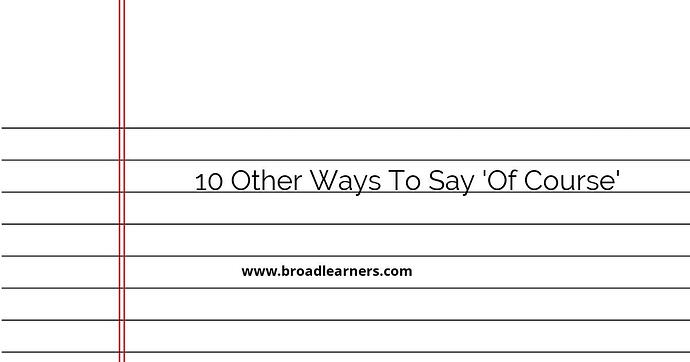When someone asks you a question or makes a request, responding with 'Of course' is a friendly and positive way to show agreement or willingness to help. However, using the same phrase repeatedly can become monotonous. Here are 10 alternative ways to say 'Of course':
- Certainly
- Absolutely
- No problem
- Definitely
- Without a doubt
- For sure
- Indeed
- Absolutely
- By all means
- Of course, I'd be happy to
Let's explore each alternative in detail:
1. Certainly
'Certainly' is a formal and polite way to express agreement or willingness. It conveys a sense of confidence and assurance. You can use it in both formal and informal settings.
Example: Would you like some more coffee? Certainly, I can get you another cup.
2. Absolutely
'Absolutely' is a strong and emphatic way to express agreement or confirmation. It shows a high level of certainty and enthusiasm.
Example: Can you help me with this project? Absolutely, I would love to contribute.
3. No problem
'No problem' is a casual and relaxed way to respond positively to a request. It implies that fulfilling the request is easy and not a burden.
Example: Could you lend me your pen? No problem, here you go.
4. Definitely
'Definitely' is a confident and straightforward way to express agreement or certainty. It indicates a strong affirmation.
Example: Will you join us for dinner? Definitely, I would love to join.
5. Without a doubt
'Without a doubt' conveys absolute certainty and agreement. It emphasizes that there is no room for doubt or hesitation.
Example: Can you finish the report by tomorrow? Without a doubt, I will have it ready.
6. For sure
'For sure' is an informal and enthusiastic way to express agreement or confirmation. It is commonly used in casual conversations.
Example: Do you want to go to the movies tonight? For sure, let's go.
7. Indeed
'Indeed' is a formal and sophisticated way to agree or confirm something. It adds a touch of elegance to your response.
Example: Is the information accurate? Indeed, it is based on extensive research.
8. Absolutely
'Absolutely' is a strong and emphatic way to express agreement or confirmation. It shows a high level of certainty and enthusiasm.
Example: Can you help me with this project? Absolutely, I would love to contribute.
9. By all means
'By all means' is a polite and formal way to express agreement or willingness. It implies that you are happy to oblige or assist.
Example: Would you like me to book a table for dinner? By all means, I can make the reservation.
10. Of course, I'd be happy to
'Of course, I'd be happy to' is a more elaborate way to express agreement or willingness. It shows enthusiasm and willingness to help.
Example: Can you proofread my essay? Of course, I'd be happy to help you with that.
Now you have a variety of ways to express agreement or willingness instead of using 'Of course' every time. Choose the one that best suits the context and your personal style.
Did I miss anything? Respond below
